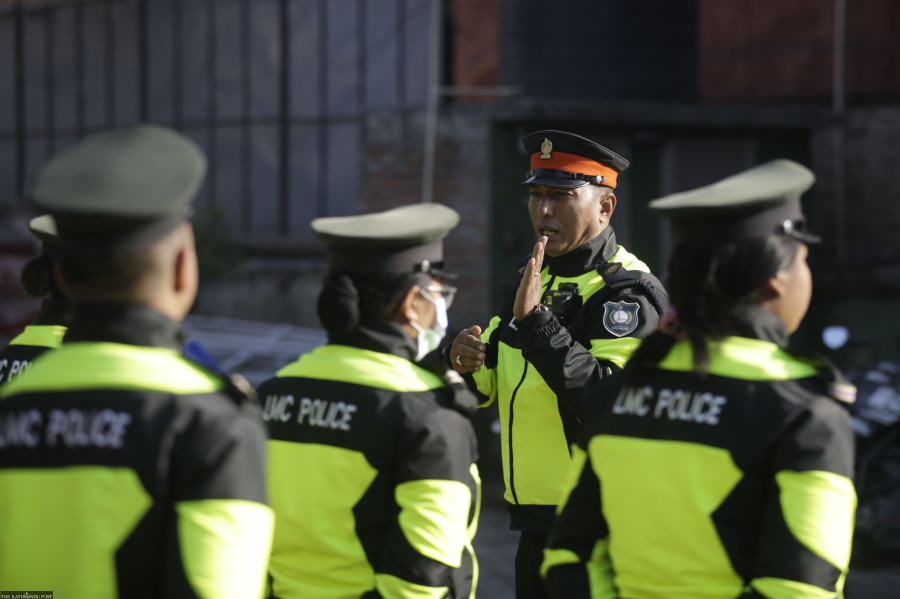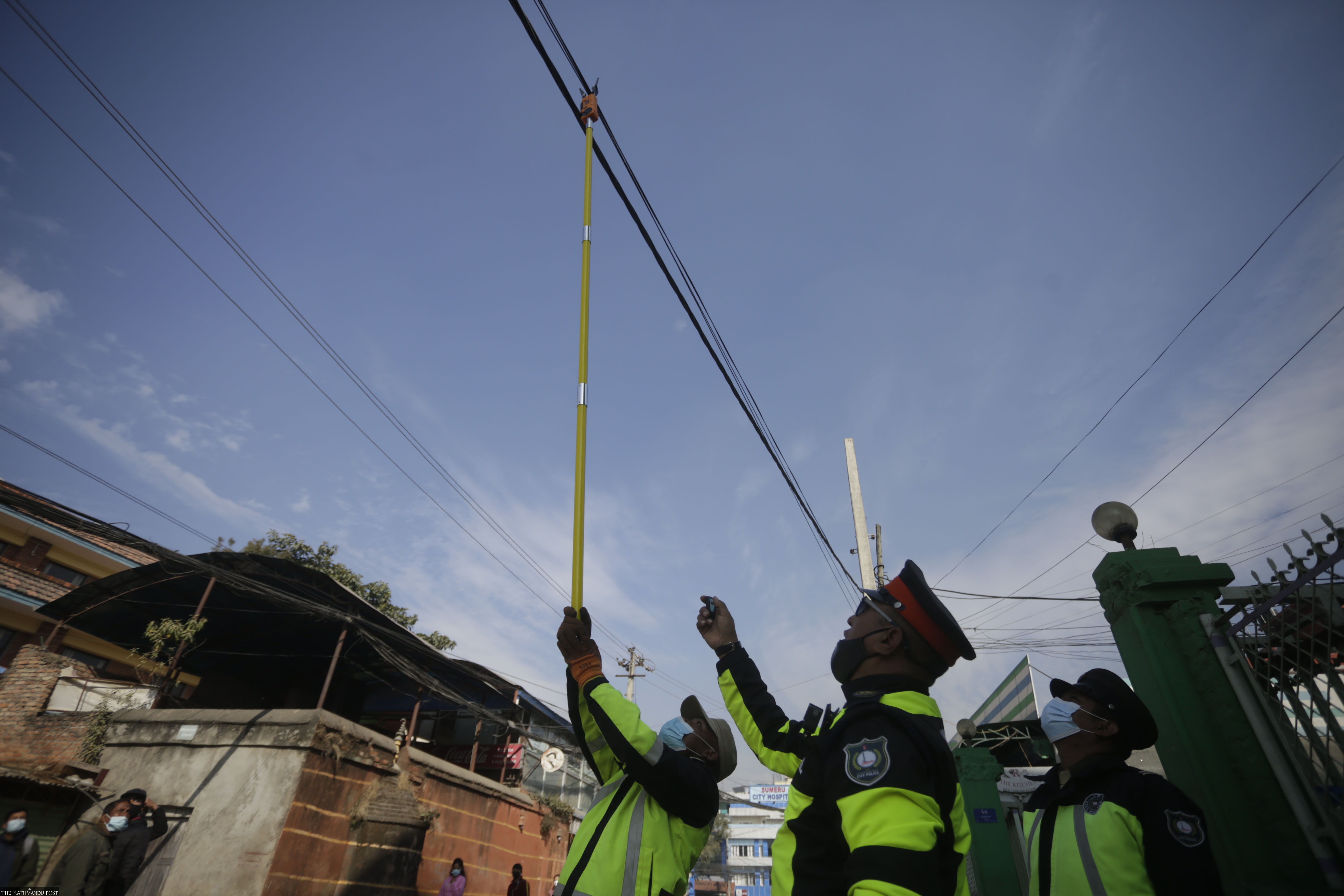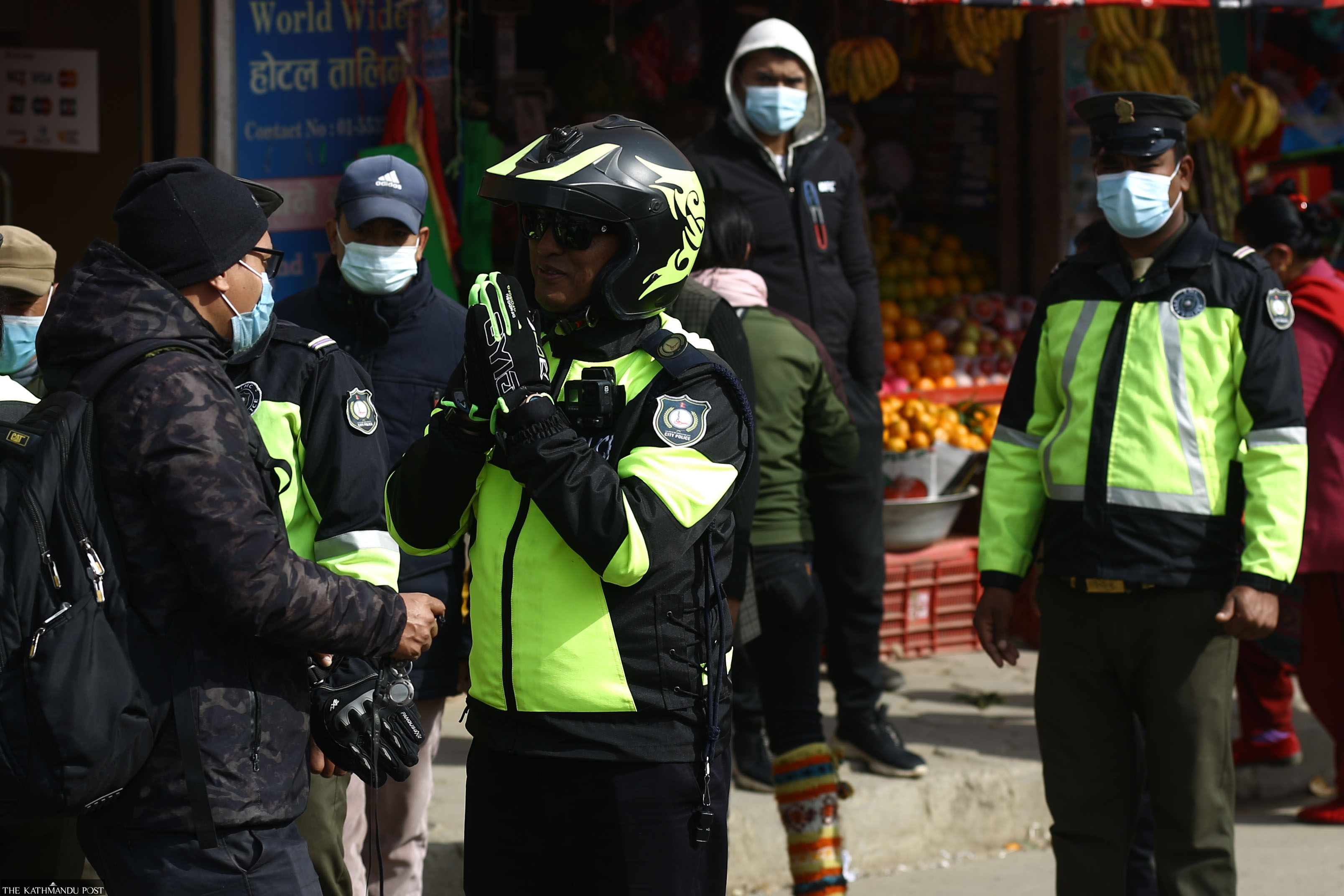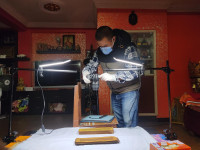Culture & Lifestyle
Dedicated to making a difference
After serving 29 years as a traffic police officer, Sitaram Hachhethu is adamant about setting a new benchmark for Lalitpur Metropolitan City Police.
Srizu Bajracharya
On a recent chilly morning, at five minutes past nine, Sitaram Hachhethu, wearing his black and green uniform, perkily marched from left to right at the Lalitpur Metropolitan City Police (LMCP) ground in Pulchowk. His subordinates, who were also present at the ground, stood with their backs straight. Every morning, Hachhethu, the chief of LMCP, holds a brief meeting with his colleagues.
“I know our job is difficult, but we don’t have to be rude to people to do our job. We can smile and tell people how they are wrong to violate rules … Make sure you listen to people and don’t blatantly shout at them,” he said to his colleagues.
Hachhethu joined LMCP about 16 months ago after being summoned by Chiribabu Maharjan, Lalitpur’s mayor. Before taking up his current role, Hachhethu was living a retired life after serving 29 years in Nepal Police at its Metropolitan Traffic Police Division. When the offer from the mayor came, Hachhethu says he was overwhelmed and beyond happy.
“I was just so grateful to see his trust in me,” said Hachhethu, at his office after sending off his officials to the field duties. “A lot of people questioned my decision to join [LMCP] after being a traffic police officer for almost thirty years. Truth be told, I was feeling restless in my retired life. I think I was just used to working day in and day out for all these years. Working as the chief of LMCP has been challenging but I am happy at my job.”
Since taking over the helm of LMCP, Hachhethu says his team have executed numerous jobs to break the unpopular image LMCP officials have had for years as city bullies. In the last year and a half, his team has fixed dangling wires, filled potholes, brought down obstructive roadside poles, liquor adverts, illegal fences, and road-encroaching shops. They have also cleaned roadways, sattals, and temples, managed crowds, roadside vendors, and everything in between.
Back at his office, Hachhethu’s phone rang frequently. Many of the calls were from civilians complaining that their vehicles were towed away by LMCP officials. A few weeks ago, his team introduced penalties for those parking their vehicles at no parking zones in the Lalitpur metropolitan city. As per the rule, two-wheeler and four-wheeler violators are fined Rs 500 and Rs 1,000, respectively.
Many that day even came to Hachhethu’s office to share their grievances after being penalised. He made sure that he listened to all the complainants and carefully and amicably explained the rules and why the organisation imposed them.
“We prosecute roadside vendors for obstructing lanes with their trades but don’t hold accountable people who park their vehicles in no-parking zones and on pedestrian paths. It is unfair that we only penalise those trying to earn their living. This is why we decided to penalise parking violators,” said Hachhethu. “What we are trying to do is build a system. And I think a day will come when this rule will no longer seem absurd, and people will start being mindful of their activities on their own.”
One of the complaints Hachhethu received that day was against his own official. The said official had misbehaved with a civilian while on duty.
“Send him [the official] to the market side and take him out of there [the area he was inspecting]. He has already done this before,” commanded Hachhethu over the phone to his associate.

Hachhethu’s office is decorated with photographs of awards and appreciation certificates he has received over the years. One of the more important awards he has received is the Gorkha Dakshina Bahu for his contribution to the country.
In the 29 years that he served as a traffic police officer, Hachhethu has received 129 awards for his outstanding performance.
During his tenure at the Metropolitan Traffic Police Division, Hachhethu also pushed for many reforms. In December 2011, under the supervision of Deputy Inspector General (DIG) Ganesh Rai of Traffic Police, Hachhethu introduced stringent checking to nab those driving under the influence, popularly known as ‘MaPaSe’. In 2016, under the supervision of DIG Prakash Aryal of Traffic Police, Hachhethu introduced body cams for traffic police officers. He also raised funds to construct the traffic police office buildings in Kalimati, Durbarmarg, Koteshwor, and Satdobato.
During his career as a traffic police officer, Hachhethu featured in the news time and again. He was once covered extensively in the news for arresting a minivan driver driving 26 school children in a vehicle meant to carry only ten people. Another incident that made him a well-known figure was his involvement in rescuing a bus conductor in a traffic accident in Soaltee Mode, Kalimati. When he was posted in Durbar Marg, Hacchethu was known for his unique way of handling the traffic in the area.
When he retired from Nepal Police, Hachhethu tattooed the line ‘Traffic niyam palana garau’ (Follow traffic rules) on his left hand.
“The tattoo artist asked me several times if I wanted to do this to myself. He thought I was crazy. But as trivial as it may seem, traffic rules are what gets everyone home safely. Following traffic rules saves lives and gives us meaningful time with our loved ones. And having devoted much of life to that cause, it felt like a necessary closure,” he said, laughing.

When asked how he ended up joining Nepal Police’s traffic division, Hachhethu shared an anecdote that felt like a coming of age story of a mischievous, free-spirited boy who everyone believed would not be able to do anything in life.
Hachhethu describes himself as a good-for-nothing lad before joining the traffic police force. “I spent my time slacking when everyone else was busy working hard,” he shared.
Things changed when young Hachhethu saw a traffic police officer on duty. “In 1988, when King Birendra came to meet earthquake victims of Bhaktapur, a lot of people came to get a glimpse of the king. A traffic police officer came to disperse the crowd, and all he did was blow his whistle and hit his stick twice on the ground, and the crowd dispersed. As a young boy, I was blown away by how the officer carried himself and controlled the crowd. That was when I knew I should become a traffic police officer,” said Hachhethu with a wide grin on his face.
At Lagankhel that afternoon, Hachhethu blew his whistle and signalled people to move aside their vehicles to avoid traffic jams. Many drivers gave him a warm smile, and some even greeted him. On the other hand, many roadside vendors waiting and looking for a chance to sell their goods were careful not to get seen by Hacchethu. While talking to elderly street vendors, Hachhethu shed his strict demeanour and suddenly became polite.
“Aama, keep yourself moving hai even if you are selling and don’t block the road,” he said to an elderly vendor selling spinach. “We understand that vendors come to Lagankhel to make a living, but we have also got to make sure they do not obstruct vehicles and pedestrians. This is why we have allotted a specific time in the mornings and evenings to street vendors so they can make a living as well. But not everyone complies.”
Given the nature of the jobs he has held over the years, Hachhethu says he avoids building personal relationships and rejects offers of hospitality from people.
“To do the job I do, I need to be free from the burden of relationships as I know these relationships might require me to do things I am not willing to do. I like to be independent at my work. And I don’t mind working 24/7,” said Hachhethu.
His work ethic no longer surprises Biju Pradhan, Hachhethu’s wife.
“I have never tried to stop him from doing what his job demands from him because I understand how much he loves his work. As family members, all we can do is offer him the support and strength he requires to perform his duties well,” she said. “Our children are understanding kids, and growing up, they understood why their father was not around them much. They might have felt bad sometimes, but they have always taken pride in his achievements.”
Hachhethu agreed that his dedication to work has come at the cost of family time.
“I have never dropped my children to school. My wife has always juggled her work and home duties and cared for the family. I am grateful for my family’s understanding,” said Hachhethu. “When I eventually retire, I have promised my wife to take her on more holidays. But right now, I need to do my job right. I don’t want to let down the hopes of the people who have given me this opportunity. I think I have earned a reputation as an honest and hardworking traffic officer, and I want to earn the same as the chief of Lalitpur Metropolitan City Police.”




 9.34°C Kathmandu
9.34°C Kathmandu















